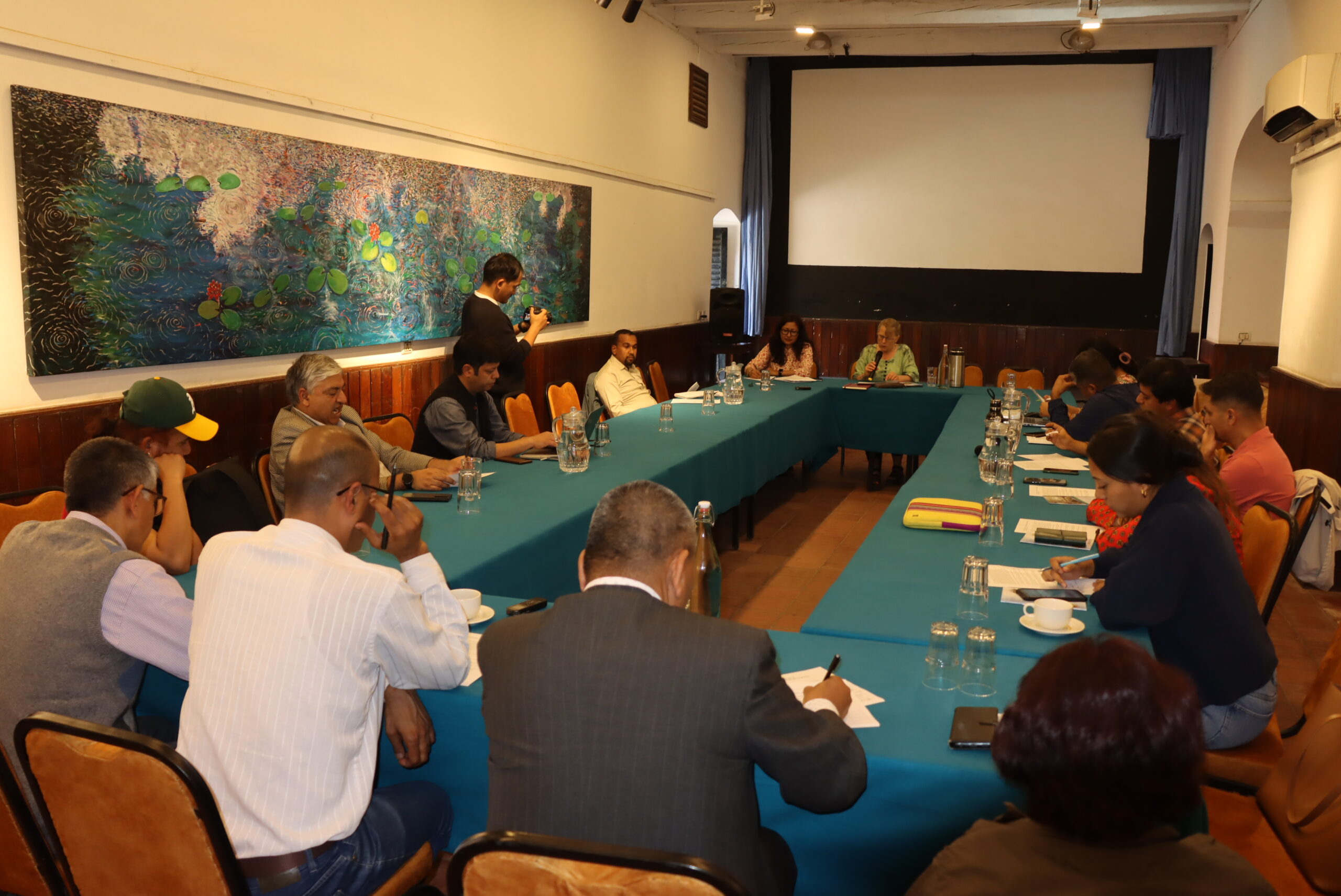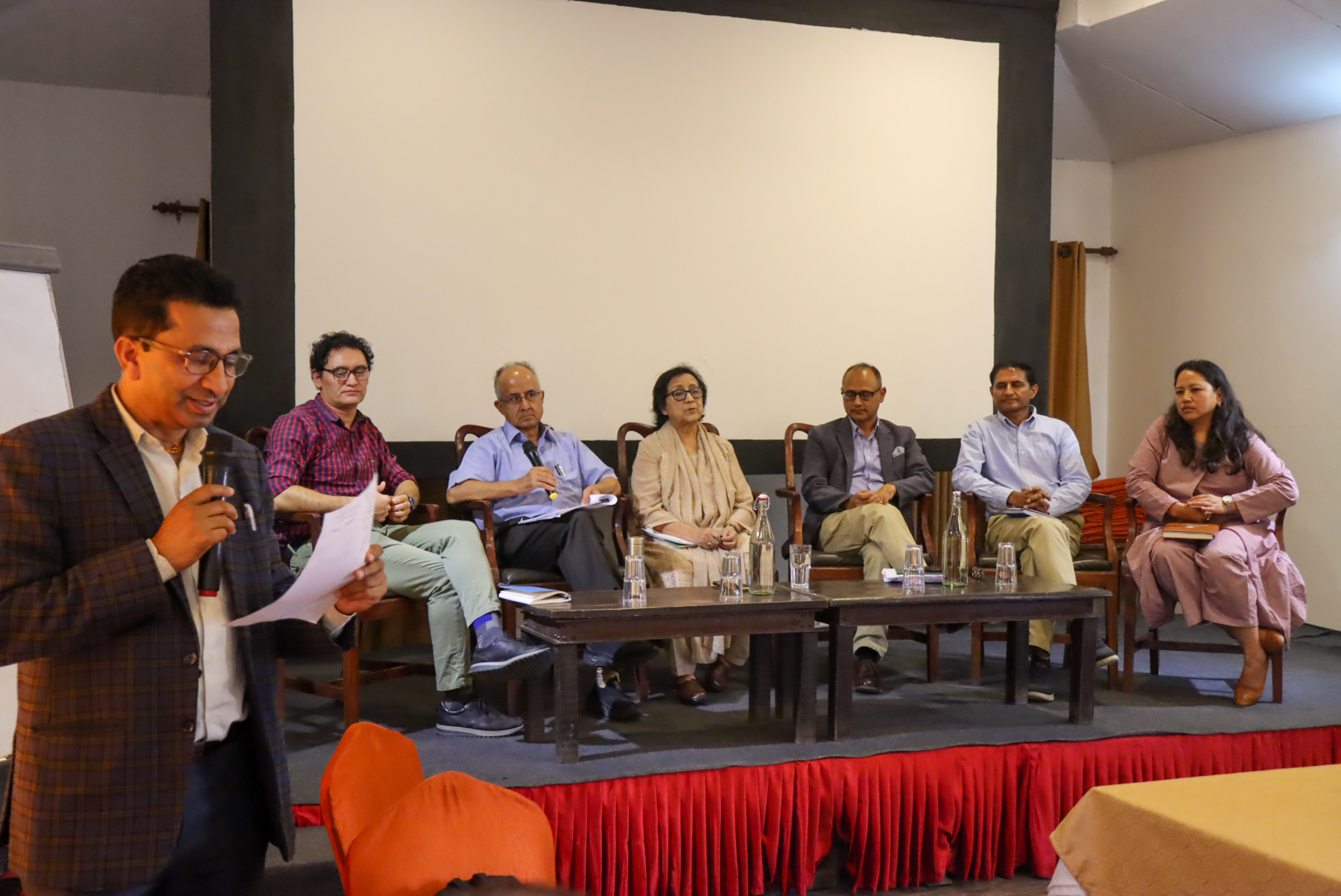-May 24, 2024
Southasia Institute of Advanced Studies (SIAS) with UKRI GRCF-funded Tomorrow’s Cities project organized a dialogue on “Urbanisation, Urban Disasters, and Future Cities” on May 24, 2024, at Yala Maya Kendra in Patan Dhoka, Lalitpur under the chairmanship of Mr. Krishna Gyawali, Chairperson of SIAS. The event featured more than 30 distinguished experts from various institutions (e.g., LMC, NPC, MoUD, IoE, CDG, UNDP, UN-Habitat, ICIMOD, NDRC, NDRI, CDC, CIUD, Social Science Baha, FHI360, SOHAM Nepal), with the Mayor of Lalitpur Metropolitan City (LMC), Mr. Chiri Babu Maharjan serving as the Chief Guest and Prof. Dr. Sangeeta Singh, a member of the National Planning Commission (NPC), as a special guest. The event was divided into two parts: 3 presentations and a panel discussion.
Dr. Dilli Poudel from SIAS delivered the welcome remarks, highlighting the event’s objectives. This was followed by the first presentation on the yet-to-be-unveiled policy brief titled “Policies for Tomorrow’s Risk-Resilient and Equitable Cities”, where he shared key findings drawing on the 5-years of experiences of Tomorrow’s Cities project implemented in Khokana (LMC-21) and Rapti (capital city of Lumbini province, Nepal) and recommended empirically grounded, co-produced and envisioned policies for tomorrow’s risk-resilient and equitable cities. Subsequently, the policy brief titled “Policies for Tomorrow’s Risk-Resilient and Equitable Cities” was unveiled by the Mayor of LMC, Mr. Maharjan, Prof. Dr. Singh, and Mr. Gyawali.
The event continued with two compelling presentations from the Institute of Engineering (IoE) and the Central Department of Geography (CDG). Dr. Basanta Adhikari from IoE presented Nepal’s geohazard scenarios in the increasing urbanization context, illustrating landslides and floods with examples from various regions of Nepal. Associate Professor Shova Shrestha presented intriguing trends in urban growth (population and land uses) across 18 municipalities in the Kathmandu Valley (KV), along with their future predictions and the emerging cities/municipalities of KV in the next decade. This first session ended with a Q&A moderated by Dr. Mani Ram Banjade, on the three presentations made.
The panel included Deputy Mayor of LMC, Ms. Manjali Shakya Bajracharya, Mr. Yekraj Adhikari, Joint Secretary of the Ministry of Urban Development (MoUD), and Dr. Sunil Babu Shrestha, former NPC member and former Vice Chancellor of the National Academy of Science and Technology (NAST). During the Panel discussion moderated by Dr. Netra P. Timsina, Mr. Yekraj Adhikari highlighted the government’s plans to develop 54 new cities, with an initial focus on 10 mid-hills cities. However, due to budgetary constraints and fragmented government institutions, progress has been slow. Ms. Manjali Shakya pointed out that while the government appreciates the support from various organizations in policy-making, some policies are so complex that they are difficult to implement. She added, the inability to strictly enforce certain policies has led to irregular and haphazard urban development, exacerbating existing problems and issues. Dr. Sunil Babu Shrestha congratulated LMC and the TC team for their initiatives aimed at establishing LMC as a cultural city. He further elaborated on the government’s plans for developing an identity-based city, emphasizing the concept of a food-green city. He added, a city plan requires continuity and a seamless development strategy. Dr. Shrestha also shared that creating a smart city requires more than just smart citizens; it demands that local government, infrastructures, plans, policies, and budgets all be smart as well.
The panel discussion was followed by a Q&A session, during which enthusiastic expert participants shared their views and queries with the panelists and other participants. The event concluded with closing remarks from the chairperson, Mr. Krishna Gyawali, who wholeheartedly thanked all the presenters, panelists and participants for their involvement and for making the event interactive.




